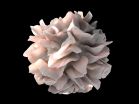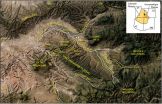Atlas of thoughts
Since Quantum Games came online as a citizen science project to help scientists develop a quantum computer, the game has been played 400,000 times, making it possible for researchers at Aarhus University to discover a kind of 'atlas of human thoughts'
2015-03-19
(Press-News.org) Are humans born with the ability to solve problems or is it something we learn along the way? A research group at the Department of Physics and Astronomy, Aarhus University, is working to find answers to this question.
The research group has developed a computer game called Quantum Moves, which has been played 400,000 times by ordinary people. This has provided unique and deep insight into the human brain's ability to solve problems. The game involves moving atoms around on the screen and scoring points by finding the best way to do so.
In this way, ordinary people contribute to quantum physics research. Associate Professor Jacob Sherson, director of the research group, explains that a player's ability to make a strategy and solve a problem is markedly different from the way a computer works. Based on 400,000 game solutions, he can make a start on compiling the results.
"We're very grateful that the game has been so well received. We've seen that the players were surprisingly good at solving the problems we raised in the game. We saw, for instance, a player with only knowledge of ninth-grade physics who solved a quantum physics problem that you would normally need a PhD in physics just to understand. The game has proved to be a very effective way to map the human thought process," he says.
The aim of Quantum Moves was to develop a game that could help the researchers look for new ways to develop quantum computers by providing them with insight into the thoughts of a person as opposed to the process in a computer.
"The players showed us that there's an unexploited capacity for ingenuity in the human brain. We see solutions that a computer would never have allowed, and which optimise the processes," says Associate Professor Sherson.
Boys versus girls
The group is not yet ready to make a conclusion about the balance of power between man and machine, but one thing they can already say in a clear voice is that females were better at solving problems than males. The results were recently published in the prestigious journal Human Computation.
"We can somewhat poetically say that there's possibly a special kind of female intuition that unfolds before our eyes in the game, compared with a caricature of a male approach that's more risky and action-oriented," says Andreas Lieberoth, who is a games psychologist and first author of the article, and a member of the group at Aarhus University. "It's a wild hypothesis that we'd like to test further," he adds.
This new insight into the human thought process will now form the basis for a new game launched by the group at Aarhus University, known as the AU Ideas Centre for Community Driven Research - or CODER for short. The game is called Quantum Minds, and aims to clarify how the human brain goes about solving a problem.
"It would be very interesting to find that the feminine brain has a different - and more efficient - approach than the masculine one. Can we use the new game to map the underlying factors? This is what we're hoping for," explains Associate Professor Sherson.
The new game was developed in collaboration between CODER and the Max Planck Institute for Human Development in Berlin, where Predoctoral Fellow Jana Jarecki is taking part with a focus on the cognitive aspects of the game.
"This game can contribute to creating an understanding of our cognitive processes. It's a wonderful opportunity for us to create a basic understanding of how human learning works," she says.
The joy of oblivion!
One of the major theses behind the new game is that humans are blessed with the ability to disregard irrelevant things in a problem and focus on the solution. This is where a computer is not quite as sharp because it is unable to ignore even the most obscure details, and will always include them in the work solving the problem. In other words, it is an advantage for humans that we are able to forget.
"We presumably manage to separate whatever is of no importance in relation to a given problem. We hope to transfer this to the work with quantum computers, where the behaviour of atoms is the crucial factor. If we can teach a computer to behave a little more like us, we could use this in new experimental set-ups here at the Department of Physics and Astronomy," says Associate Professor Sherson.
The games also represent a new trend that the research group hopes to develop further - user-involved research.
"By trying out the games, the players contribute directly to revolutionary new knowledge. In addition to gaining new insight, we are laying the foundations for the virtual university, where 'ordinary' people from all over the world can contribute to scientific research. The quantum games are a large step in this direction, and we now hope that lots of people will want to play and help us create a more detailed atlas of thoughts," concludes Associate Professor Sherson.
INFORMATION:
A new game, Quantum Minds, has just been launched and is now available to the public to play. Everyone is welcome to join in and contribute to the research by playing Quantum Minds at http://scienceathome.org/play/
Jana Jarecki from the Max Planck Institute for Human Development in Berlin explains more about how to participate in Quantum Minds, and what it means when the team says that players contribute to research, in this short video (in English) on Youtube:
https://www.youtube.com/watch?v=gnqQcCgYji4
ELSE PRESS RELEASES FROM THIS DATE:
2015-03-19
Scientists at the University of Cambridge have successfully created 'mini-lungs' using stem cells derived from skin cells of patients with cystic fibrosis, and have shown that these can be used to test potential new drugs for this debilitating lung disease.
The research is one of a number of studies that have used stem cells - the body's master cells - to grow 'organoids', 3D clusters of cells that mimic the behaviour and function of specific organs within the body. Other recent examples have been 'mini-brains' to study Alzheimer's disease and 'mini-livers' to model ...
2015-03-19
Women who received a text message reminding them about their breast cancer screening appointment were 20 per cent more likely to attend than those who were not texted, according to a study published in the British Journal of Cancer today (Thursday)*.
Researchers, funded by the Imperial College Healthcare Charity, trialled text message reminders for women aged 47-53 years old who were invited for their first appointment for breast cancer screening.
The team compared around 450 women who were sent a text with 435 women who were not texted**. It found that 72 per cent ...
2015-03-19
PISCATAWAY, N.J. (March 18, 2015) - New research published by Rutgers University chemists has documented significant progress confronting one of the main challenges inhibiting widespread utilization of sustainable power: Creating a cost-effective process to store energy so it can be used later.
"We have developed a compound, Ni5P4 (nickel-5 phosphide-4), that has the potential to replace platinum in two types of electrochemical cells: electrolyzers that make hydrogen by splitting water through hydrogen evolution reaction (HER) powered by electrical energy, and fuel cells ...
2015-03-19
The number of people living with cystic fibrosis into adulthood in the UK is expected to increase dramatically - by as much as 80 per cent - by 2025, according to a Europe-wide survey, the UK end of which was led by Queen's University Belfast.
People living with cystic fibrosis have previously had low life expectancy, but improvements in treatments in the last three decades have led to an increase in survival with almost all children now living to around 40 years. In countries where reliable data exists, the average rise in the number of adults with CF is expected to be ...
2015-03-19
A recent study published in the Journal of the American Academy of Child and Adolescent Psychiatry reports that following military parents' return from combat deployment, their children show increased visits for mental healthcare, physical injury, and child maltreatment consults, compared to children whose parents have not been deployed. The same types of healthcare visits were also found to be significantly higher for children of combat-injured parents.
Children of deployed parents are known to have increased mental healthcare needs, and be at increased risk for child ...
2015-03-19
When cancer strikes, it may be possible for patients to fight back with their own defenses, using a strategy known as immunotherapy. According to a new study published in Nature, researchers have found a way to enhance the effects of this therapeutic approach in glioblastoma, a deadly type of brain cancer, and possibly improve patient outcomes. The research was funded by the National Institute of Neurological Disorders and Stroke (NINDS) as well as the National Cancer Institute (NCI), which are part of the National Institutes of Health.
"The promise of dendritic cell-based ...
2015-03-19
Boulder, Colo., USA - Unaweep Canyon is a puzzling landscape -- the only canyon on Earth with two mouths. First formally documented by western explorers mapping the Colorado Territory in the 1800s, Unaweep Canyon has inspired numerous hypotheses for its origin. This new paper for Geosphere by Gerilyn S. Soreghan and colleagues brings together old and new geologic data of this region to further the hypothesis that Unaweep Canyon was formed in multiple stages.
The inner gorge originated ~300 million years ago, was buried, was then revealed about five million years ago when ...
2015-03-19
Latinos are the largest ethnic minority group in the United States, and it's expected that by 2050 they will comprise almost 30 percent of the U.S. population. Yet they are also the most underserved by health care and health insurance providers.
Latinos' low rates of insurance coverage and poor access to health care strongly suggest a need for better outreach by health care providers and an improvement in insurance coverage. Although the implementation of the Affordable Care Act of 2010 seems to have helped (approximately 25 percent of those eligible for coverage under ...
2015-03-19
Could our reaction to an image of an overweight or obese person affect how we perceive odor? A trio of researchers, including two from UCLA, says yes.
The researchers discovered that visual cues associated with overweight or obese people can influence one's sense of smell, and that the perceiver's body mass index matters, too. Participants with higher BMI tended to be more critical of heavier people, with higher-BMI participants giving scents a lower rating when scent samples were matched with an obese or overweight individual.
The findings, published online in the ...
2015-03-19
COLLEGE STATION -- Researchers at Texas A&M AgriLife Research have developed a new technology to determine sensitivity or resistance to rabies virus.
"We were able to create a novel platform such that we could look at how pathogens, such as bacteria or virus or even drugs or radiation, interact with specific human genes," said lead researcher Dr. Deeann Wallis, AgriLife Research assistant professor of biochemistry and biophysics. "It allows us a new way to profile the genes involved in sensitivity or resistance to certain agents."
The rabies work is being reported in ...
LAST 30 PRESS RELEASES:
[Press-News.org] Atlas of thoughts
Since Quantum Games came online as a citizen science project to help scientists develop a quantum computer, the game has been played 400,000 times, making it possible for researchers at Aarhus University to discover a kind of 'atlas of human thoughts'


